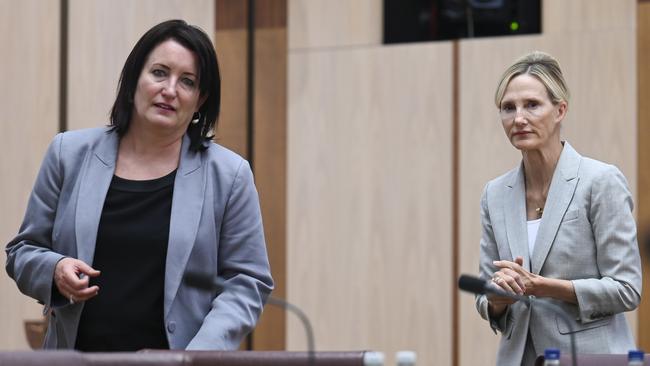Meta cornered on news content, online harms and scam ads
Meta has been challenged on its claim that news articles only account for three per cent of the material its users see every day.

Meta has been challenged on its claim that news articles account for only 3 per cent of the material its users see every day – a statistic that has been relied upon by the tech giant to justify its refusal to pay media companies for their news content.
Two senior executives from Meta, which owns Facebook, Instagram and WhatsApp, fronted a parliamentary hearing on Wednesday to face further questions on the company’s threat to block Australian news content from its social media platforms, and its efforts to protect children from viewing harmful content on the sites.
Meta’s regional director Mia Garlick told the inquiry the push to force the tech company to negotiate with Australian news media outlets for fair compensation for the use of their content – under the terms of the news media bargaining code – had not progressed in recent months, and as a result it was still a possibility that Australian news articles would be blocked from Facebook.
Ms Garlick said the legislation, introduced by the Morrison government, was “unworkable” and not “reflective of the economic realities of news on our services”.
She was forced to concede that a claim repeatedly cited by Meta – that news content makes up only 3 per cent of the average user’s newsfeed – was based on US data, and she was unable to specify a comparable statistic for the company’s Australian consumers.
The 3 per cent figure, hotly contested by Australia’s news media companies, was Meta’s central justification for its decision to walk away from its deals to pay for Australian news content on its platforms.
While Ms Garlick said she had no specific data on Australians’ use of news content on Facebook, she said she had “no reason to believe that the situation (in the US) is different in Australia”.
Independent MP Zoe Daniel challenged Ms Garlick’s claim. “I think we need more rigorous or substantive information on this, to place trust in that number of 3 per cent, and I don’t have a lot of faith in it, in the way that it’s been framed,” she told the hearing.
Meta’s vice-president and global head of safety Antigone Davis was quizzed on the tech giant’s commitment to introducing age verification systems for its social media platforms.
Ms Davis told the hearing that Australia should introduce laws to force parents to approve what apps children under the age of 16 could download. “With this solution, when a teen wants to download an app, app stores would be required to notify their parents, much like when parents are notified if their teen attempts to make an in-app purchase,” she said.
Ms Daniel asked whether this approach was “shirking responsibility for age verification or safety … So you will support some level of age assurance or age verification, as long as you don’t have to do it yourselves?
“Is that what it comes down to?”
The two Meta executives were also asked about the company’s approach to eliminating “scam ads” from its platforms.
Labor MP Susan Templeman expressed frustration that Ms Garlick was unable to provide any data on the volume of “scam ads” that had either appeared on or been removed from Facebook over the past year.
“I’m struggling to accept the lack of data on these things when you have so much data on so many other things,” Ms Templeman said.
“So, essentially, Meta is happy to register the users who place the scam ads. You approve the scam ads. Meta enables them to use the tools to target particularly vulnerable Australians.”
Ms Garlick replied: “I think I can quite confidently say we’re not profiting, given the amount of work that is involved in trying to stay a step ahead of this adversarial space.”







To join the conversation, please log in. Don't have an account? Register
Join the conversation, you are commenting as Logout